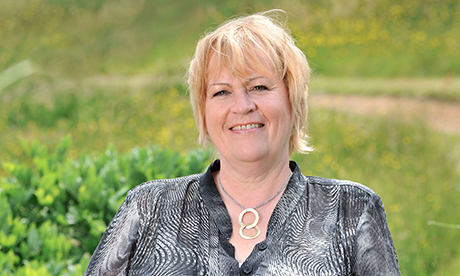Warning over ‘green skills gap’ as government sticks boot in

Sue Biggs, RHS Director General
Schools and colleges should do more to promote horticulture as an attractive career, a leading gardening charity has said.
The Royal Horticultural Society (RHS) used publicity surrounding the Chelsea Flower Show last month to warn of a “green skills gap” in Britain – a message echoed by some experts locally.
The Department for Education has announced that horticulture and other so-called land based subjects will be removed from school league tables as of next year, and the RHS says as many as 70 per cent of horticultural businesses cannot fill skilled vacancies, with
nearly 20 per cent are being forced to recruit overseas.
Russell Miller, chairman of Sustainable Hackney, agrees there is a “lack of expertise” in areas like biosecurity – the installing of preventative measures to reduce transmission of infectious diseases.
Mr Miller, a qualified arborist and is studying a masters in biological recordings, added: “Most of the money goes towards posh gardens rather than to schemes to do with the environment. If the RHS is calling for more money for protecting biodiversity, I’m for it.”
He blamed the apparent decline in people choosing to pursue horticultural or environmental careers on the “general ignorance about the environment in government and the media”.
The RHS has flagged up food security as another area where the UK may find itself wanting unless more young people are acquire the necessary skills.
Launching Horticulture Matters, the organisations report which has been sent to the government, RHS director general Sue Biggs said: “Our report calls on the Government, employers and those in the education system to take action to safeguard the critical role that horticulture plays in Britain today.
“This report isn’t an unrealistic wish list of measures. It already includes pledges of investment and commitment from the industry. But if the skills gap is to close, Government has to play its part, too.”
The irony is that this gloomy outlook is in such sharp contrast to the rising popularity (in Hackney at least) of community gardening and a general interest in all things organic, meaning not everyone is as bleak about the future of horticulture in Britain.
Comedian Jo Stephenson, a keen amateur gardener who performed a comedy show about gardening as part of the Chelsea Flower Show Fringe and has also performed on Gardeners’ Question Time, said the revival of allotments and “kitchen gardens” gave her hope.
Members of staff at Growing Concerns, a garden centre and community garden in Hackney Wick, have reported huge levels of interest in gardening courses they run for children and young people and say there is lots of interest from older people too.
One staff member said: “For people like university leavers who perhaps haven’t gone down the career path they expected, it’s quite a short step from having an interest in gardening or horticulture to realising it could actually be a very good career.”
Hackney Community College runs a horticulture course in partnership with the Hoxton Trust, and Capel Manor College in Enfield – not a million miles away – is famous for offering courses in virtually everything to do with the land, animals and plants.
Ms Stephenson said: “It doesn’t surprise me that the RHS is saying these skills are at risk. There is a general problem with skills related to the land like thatching buildings or building dry stone walls.
“Maybe young people aren’t going into gardening as a career as much these days as so much is based on the screen so people are used to being indoors. There is a risk people will lose touch with the outdoors. But I am still hopeful that there will always be people who are interested.”
Horticulture contributes £9 billion to the British economy each year as an industry. It employs 300,000 people from crop crowers and gardeners to scientists, tree surgeons and turf specialists.
The industry also believes that embedding horticulture across the national curriculum will encourage talented young people to further study the subject in higher education and to consider horticulture as a future career, and the RHS is now calling on the government to prioritise horticulture with in Research Council and other government funding areas.
